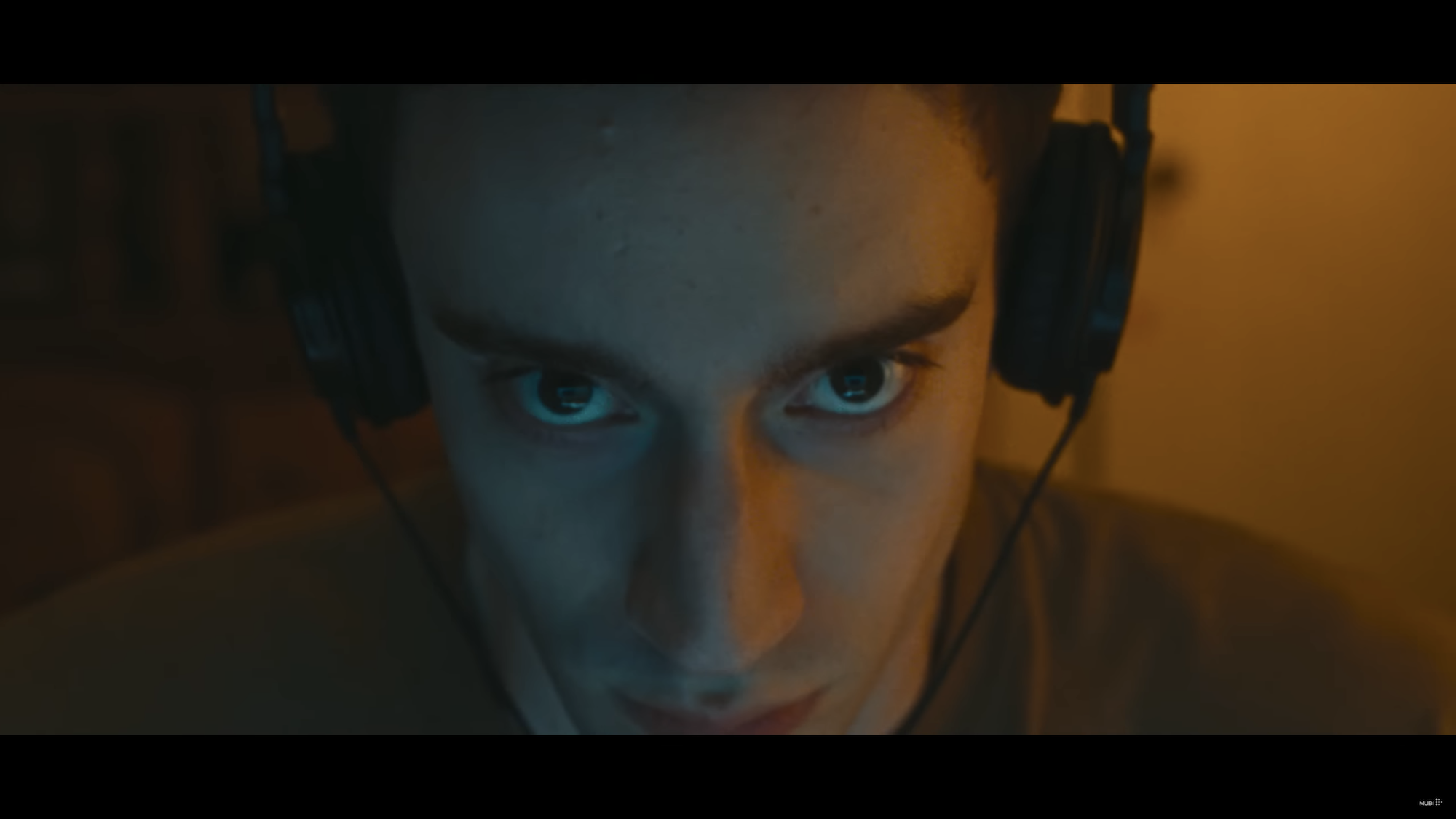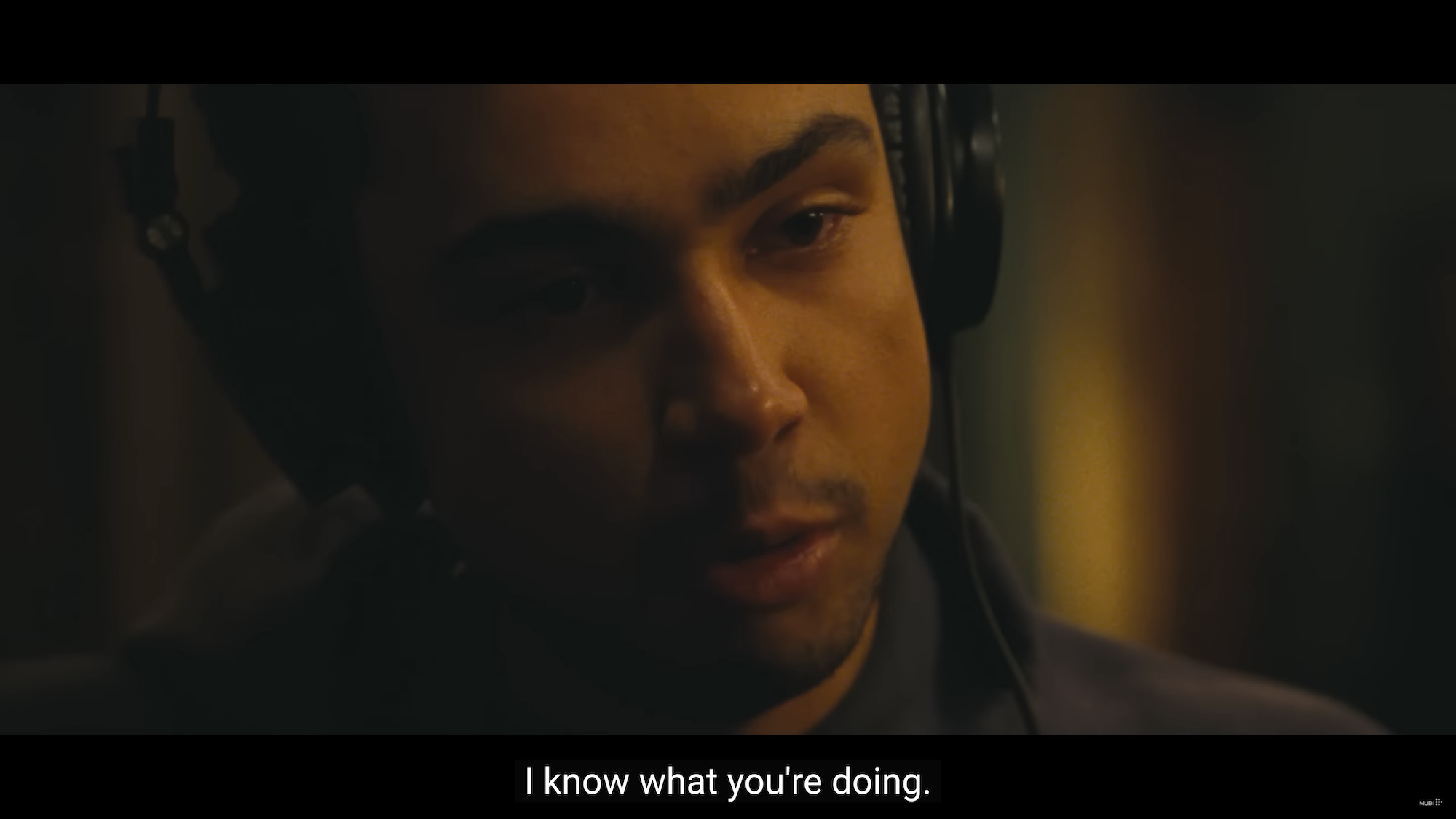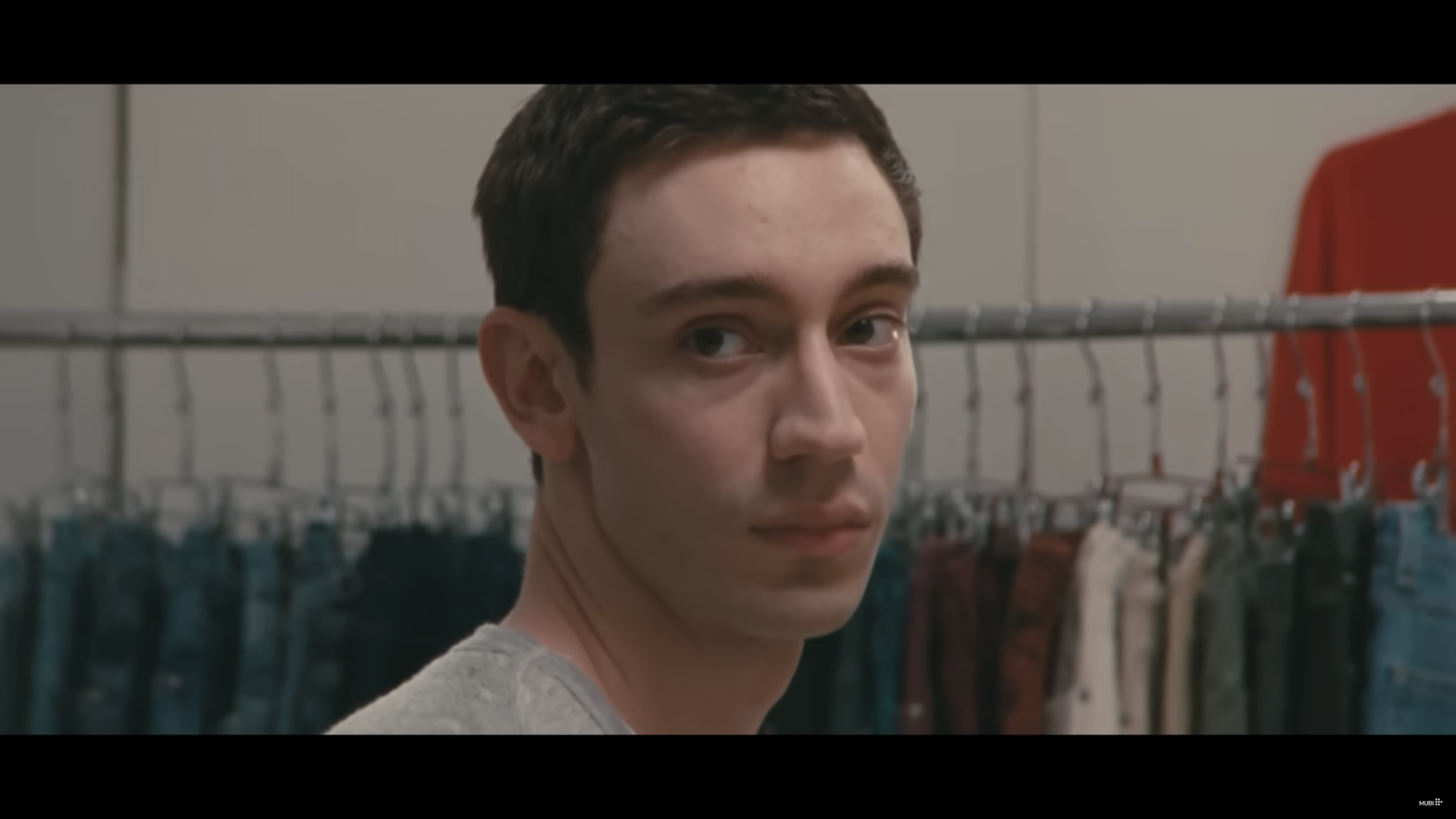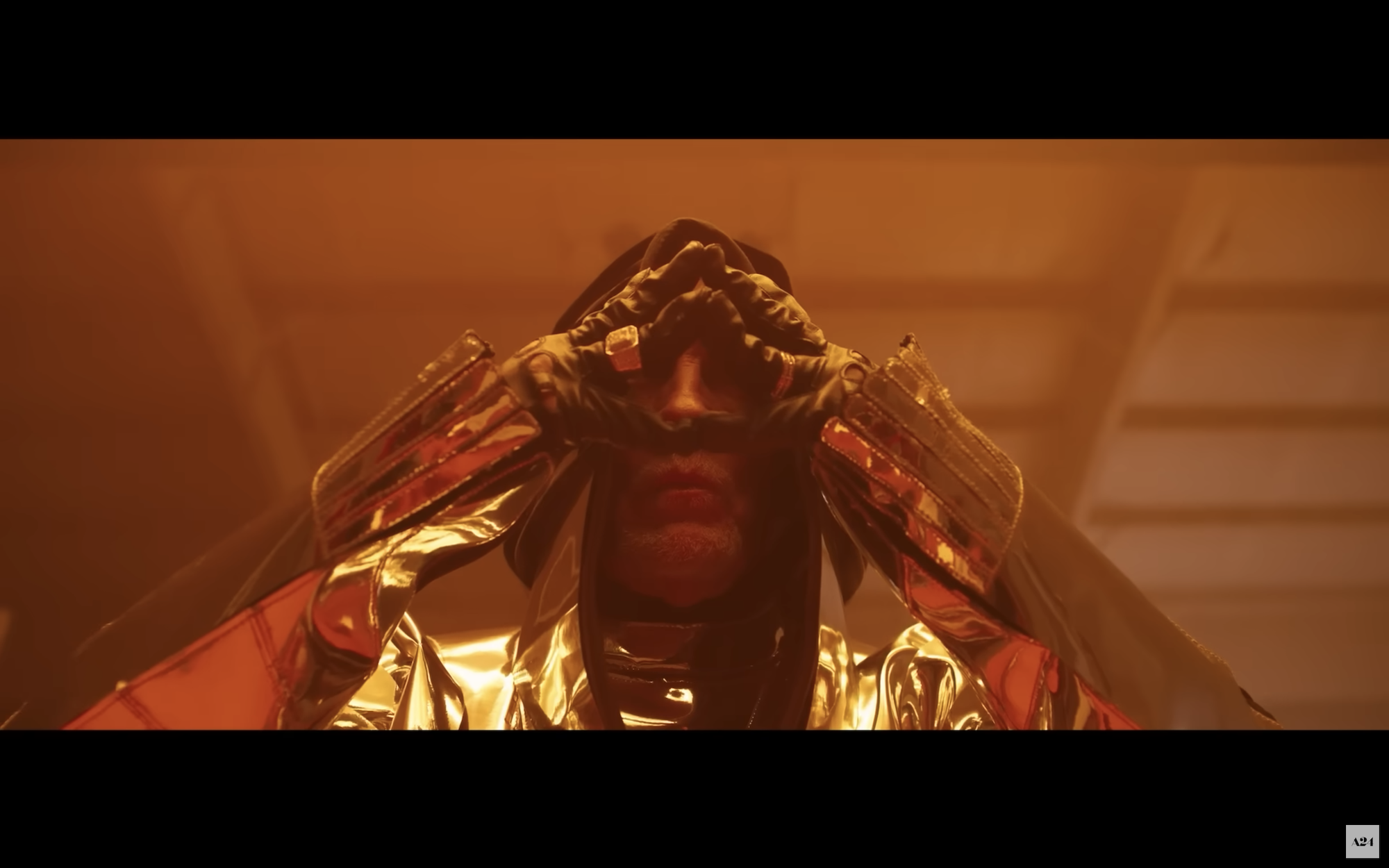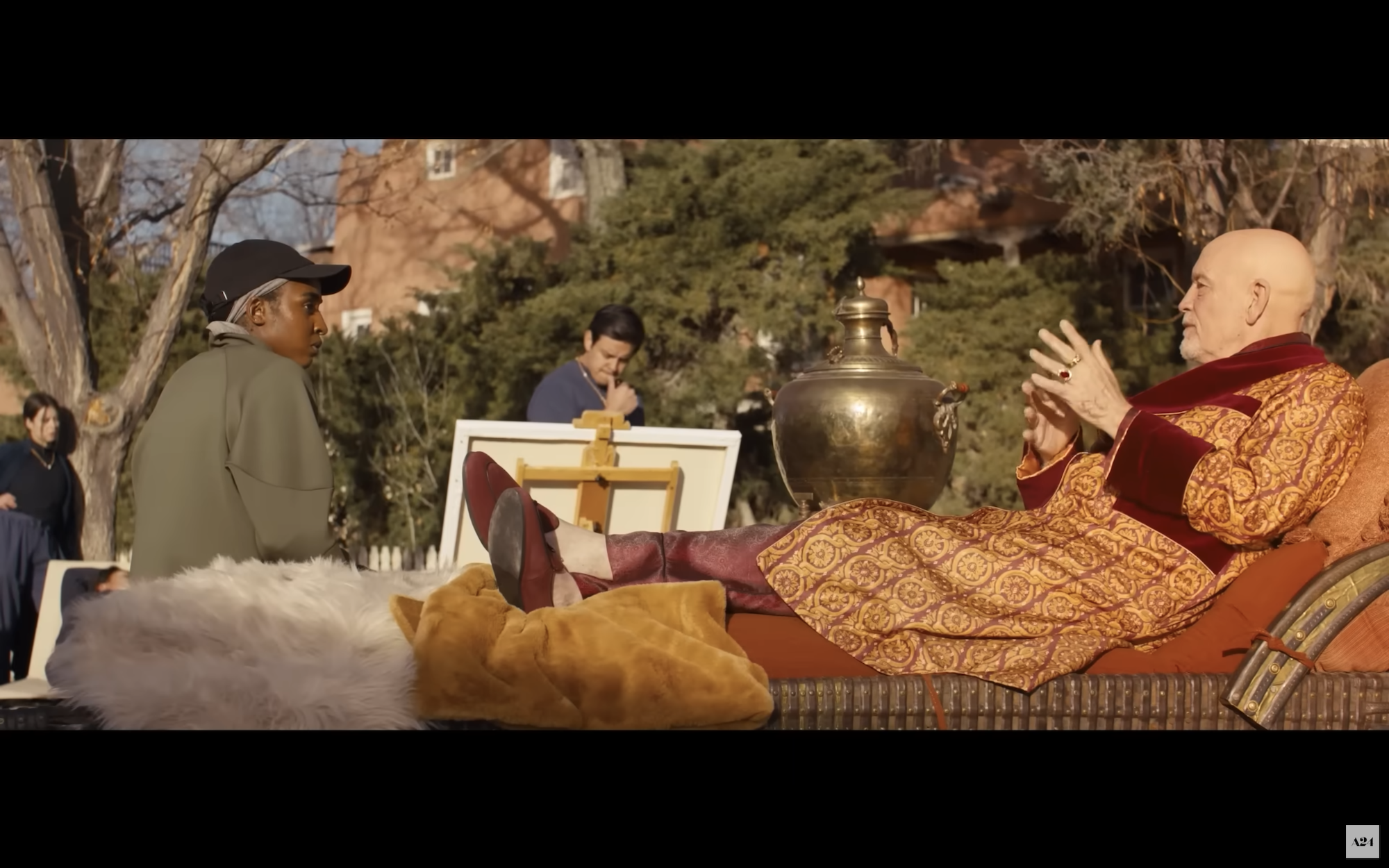Idol Horrors: The Thrills and Chills of Obsession
Jimmy Warden, Borderline, 2025, screenshot [courtesy of YouTube]
Share:
“What’s the difference between love and obsession?” There’s a scene in Alex Russell’s film Lurker (2025) in which Oliver (Archie Madekwe), an up-and-coming young British-born pop artist on the precipice of greatness, is being pelted by paintballs for a music video. Dressed in white, he stands still in front of a camera while singing the lyrics to his song and only moving ever so slightly to flinch at the onslaught of playful violence targeting him. There’s a wistful vacancy in his eyes as he winces.
Oliver, it turns out, is being held hostage. His captor is Matthew (Théodore Pellerin), who describes himself as a “visual artist.” Matthew catches Oliver’s eye when the musician visits a clothing store in Los Angeles and bonds with the meek employee who seemingly doesn’t recognize him as the celebrity that he is. Soon, Matthew is attending Oliver’s concert, going backstage, and ultimately joining his tight-knit entourage as its new documentarian. He is tasked to follow Oliver (Ollie for short) and capture his rise to fame. Fame is fickle, though, and the film observes how a budding celebrity’s tenuous social network predicated on flattery can result in anxiety and jealousy over one’s status in the hierarchy of proximity to power. What begins as a serendipitous encounter between Oliver and Matthew—two like-minded visionaries—turns into a nightmare scenario warning the viewer of the perils of letting the wrong person into your inner circle.
Alex Russell, Lurker, 2025, screenshot [courtesy of YouTube]
Pop stardom is in a horrifying place. Look no further than the Instagram feed of Britney Spears—a slew of posts with cryptic emoji-laden captions and scantily clad twirling dance recordings, which could be seen as liberatory performance art if not for the sinking realization that media exploitation has been complicit in her current infamous condition. Amid intense scrutiny over his own health, Justin Bieber confronts paparazzi while leaving an establishment, loudly asserting that he is a “human being” and “standing on business.” Lil Nas X strolls the LA streets naked and gets arrested. It’s not just pop stars who are generating levels of scandal and shock that trouble legibility to much public fascination within our attention economy. Fans, too, are behaving in ways that render fixation on a love object such as a musical celebrity both thrilling and chilling. Stanning, as it is understood, cultivates forms of extreme behavior that exemplify a kind of religiosity toward stars who are constructed as what Richard Dyer calls “heavenly bodies.” The Beyhive. Swifties. The documentary Stans (Steven Leckart, 2025) interviews multiple self-professed stans of rapper Eminem who see their fan activity as a means of personal expression and community development. The propensity to become obsessively invested in a celebrity always creepily exists beneath the surface of affinity and admiration necessary for the emergence of a fandom.
In Lurker, Matthew directly states that he is “not a fan”; his resistance to assuming this category of identity aligns with the ways that parasocial relationships function to collapse boundaries of self and other through fantasies of intimacy. Throughout the film, Matthew is interpellated into various roles, from Oliver’s best friend to his son. The lowly boutique employee, who lives with his grandmother, initially ingratiates himself into the budding pop star’s universe by dutifully washing dishes and doing laundry for his newfound crew at Oliver’s bachelor pad. Being at the home and part of the household symbolizes one’s closeness to celebrity cool. Matthew earns his keep as he lurks, always observing the scene and preparing for an opportunity to gain more favor. He is eager to please Oliver and showers him with praise: “I really think you’re going to be the biggest artist in the world.” In exchange for the recognition and adulation, Oliver legitimates Matthew by following him on Instagram, and soon Matthew is inundated with his own follows and likes. The threats of obsessiveness and possessiveness slowly creep into the frame, both visually and sonically. Multiple shots of Shai (Havana Rose Liu), the singular, level-headed woman on Oliver’s team, find her glancing at Matthew skeptically as he deftly manipulates their boss for more cachet. The pulsating electronica score from Kenneth Blume (formerly known as Kenny Beats) is set in stark contrast to Oliver’s own lighthearted pop rock music.
Alex Russell, Lurker, 2025, screenshot [courtesy of YouTube]
Alex Russell, Lurker, 2025, screenshot [courtesy of YouTube]
Writer/director Russell does not provide simple answers as to which characters should receive the audience’s sympathy. Perhaps they are all terrible people caught up in addiction to fame. Certainly, Oliver—as the up-and-coming artist—is not innocent. He intuitively understands that his attention constitutes lucrative currency to people around him, and he uses that exchange to maintain his elevated status. His predicament with Matthew becomes increasingly volatile and overtly psychosexual as the film continues. When things take a turn for the worse on a trip to London, the aftermath finds Oliver lobbing the insult of “fan boy” at a dejected and desperate Matthew. He is ostracized by the group until he blackmails them by using the most cliché bait: underaged groupies. In an instant, the tables turn, and Matthew is back in the fold—this time as the one calling the shots in Oliver’s career. During a telling scene in the recording studio, Matthew preys on a pop star’s worst fears: that his music means nothing and that he is alone, surrounded only by yes people. Everyone in his circle wants celebrity; “I just want it more,” Matthew admits.
Despite the harrowing lengths that Oliver and his crew go to free themselves of Matthew, the insecure singer ultimately comes to the realization that their toxic bond might be good for business. The final sequence of the film presents a near-future screening of another film. Matthew’s behind-the-scenes documentary has been completed and released amid Oliver’s swift rise. Oliver now has Grammy nominations under his belt, a different indicator of success and prestige. Matthew appears on stage with Oliver at a Q&A, the duo having become an example of innovative collaboration. Lurker depicts the co-construction of an idol in a terrifyingly tortuous creative process. Its ending suggests that in our contemporary milieu, fans do not stand apart from the machinery of pop stardom as mere consumers of the image. Rather, they steadily assume the role of pseudo-manager, publicist, assistant, security guard, and even family member. What is frightening about celebrity obsession writ large is how it has become an organizing logic of our current social and political age of extreme feeling and attachment.
Over the past two years, a cluster of fiction films have been released that thematize the terror of celebrity through music as an art form. Lurker, Smile 2 (Parker Finn, 2024), Trap (M. Night Shyamalan, 2024), Opus (Mark Anthony Green, 2025), Borderline (Jimmy Warden, 2025) and Hurry Up Tomorrow (Trey Edward Shults, 2025) all feature pop stars and those who love them in crisis, albeit in different ways and from a variety of perspectives. Showcasing the gritty and grotesque side of fame rather than the glamorous, these films are not all horror in the strictest sense. However, an expanded understanding of the genre encompasses those cinematic projects that make use of mystery, suspense, and dark comedy.
The most explicitly scary movie of the bunch is Smile 2. Pop star Skye Riley (Naomi Scott), while in recovery from drug addiction, is attempting to make a comeback after a traumatic incident. She falls victim to the curse of the supernatural Smile Entity in a drug deal gone bad. The sequel escalates the premise of the original Smile (2022) by torturing its most ideal subject, the train wreck female celebrity. Such a figure has often been misread as a “hysterical” woman and Smile 2 internalizes this idea but emphasizes how one could succumb to paranoia and fear in the entertainment industry as what is real and what is artifice dynamically collide. The Smile Entity taunts Skye in increasingly eerie ways until it devours her on stage during a concert. Her devoted fans witness the diva smiling maniacally while bludgeoning herself to death with a microphone.
Jimmy Warden, Borderline, 2025, screenshot [courtesy of YouTube]
Borderline is another film that features a White female pop star being stalked, this time not by an evil otherworldly force but instead by a psychopath who has escaped from a mental hospital. Sofia (Samara Weaving) is a successful Madonna wannabe who comes under threat in her palatial home. A delusional fan named Paul (Ray Nicholson) is convinced he is to marry her, and he goes to brutal lengths to ensure that a wedding takes place. Although a singular male fan—in the flesh—is the villain in Borderline, a group of online fans become the heroes during a moment of poptimism in Trap. A sold-out concert for Lady Raven (Saleka Night Shyamalan) is the primary setting for a cat-and-mouse game to catch a serial killer known as the Butcher (Josh Hartnett), who parlays as the perfect girl dad attending the show with his excited preteen offspring. M. Night Shyamalan casts his own actual daughter in the pop star role. Saleka herself writes and sings the tracks that are performed by her character on stage in the film. Once Lady Raven is in danger as the Butcher seeks his next victim, she enlists her “Flock” of female fans to help and temporarily foils his plans.
In a 2025 article for The New Yorker titled “How Music Criticism Lost Its Edge,” Kelefah Sanneh writes that “In pop music, unhinged fandom is not an unfortunate mutation—it’s the essence.” The degree to which current music criticism can be brave enough to honestly provide critique of art is dependent upon the level of sycophancy of the artist’s stan army. Critic, beware! Indeed, Opus follows a reporter who makes a sojourn to the secluded compound of Alfred Moretti (John Malkovich), an eccentric David Bowie-esque musician. Opus begins with a shot behind Moretti on stage in a red suit and platform shoes, the cheering crowd visible only as an amorphous blob of bodies waving their arms at him. As the opening credit sequence rolls, an electric guitar plays while individual fans express ecstatic jubilation in slow motion. Moretti is presented as the biggest pop star of the 1990s, but no one has seen or heard from him in nearly 30 years. We learn that the reclusive star is coming out of retirement to release his 18th studio album. He invites a select group—a paparazzo, a TV show host, an influencer, a podcaster, and two journalists—to preview the work in an exclusive listening session. One visitor is budding writer Ariel Ecton (Ayo Ediberi), who is stuck in her editor’s shadow but has professional ambitions beyond writing magazine celebrity profiles.
From the start of the weekend visit, it is clear that something is amiss. Upon arrival, Ariel and the rest of the group are immediately showered with niceties by Moretti’s followers, who are called “Levelists” and live inside the compound in secluded Green River, UT. They are accommodated in fancy suites, given makeovers, and provided with their own personal concierge service—a Levelist who never leaves their side. As Ariel is being wined and dined, she begins to notice the strange customs and practices of Moretti’s fans. They all wear blue and have scars on their hands. When Ariel asks Moretti about the Levelist agenda, the pop star obfuscates and portrays his status as that of a “simple songman.” Moretti is not simple at all, though, as demonstrated by his larger-than-life presence and gravitas. He elaborately performs for his guests and fans. Everyone is intoxicated by the entertainer except for Ariel, who grows increasingly suspicious of the whole enterprise and asks to leave. Her exit is prevented by a puppet show that turns deadly. In a bizarre sequence, Moretti presents “The Tragedy of Billie,” in which a puppet version of Billie Holiday is hounded by taxidermized rat reporters. What comes next is a body-horror bloodbath, complete with ritualistic sacrifice, from which Ariel barely escapes.
Mark Anthony Green, Opus, 2025, screenshot [courtesy of YouTube]
Mark Anthony Green, Opus, 2025, screenshot [courtesy of YouTube]
Opus cuts to two years later, and Ariel has written a bestselling nonfiction book about her horrifying experience called Our Time in the Sand. While the Levelist followers have seemingly vanished without a trace, Moretti is now imprisoned due to the violence pursued by his barbarous cult of personality. Ariel visits Moretti in prison, where he reveals his plan, all along, to grow his following through the writer, a “pure vessel completely uncorrupted by success.” In effect, she has become the Billie puppet, with Moretti pulling the strings. Ariel is dismayed by her unwitting feature role in perpetuating the musician’s influence and when she is being fawned over in a television interview, she nervously accepts the fact that, now, she is the star.
These films illuminate what it is like to be in the limelight. What they have in common is their development of an audiovisual language to describe the myth of contemporary pop stardom through forms of obsession. Their mise-en-scène indulges in the machinations of persona and the surreal quality of fame predicated upon fan worship. All these artistic choices are carefully choreographed (sometimes literally through dance numbers) and contribute to the aura around the idol. Obsession is not only aestheticized but is also rendered a technique of experience in this world of immense privilege. Privilege is also circumscribed by race. Some of these movies treat racial difference as an implicit factor in the making and breaking of the pop star. In Opus, Ariel is othered as a Black woman, yet she is the only individual attuned to, and made uneasy by, the Moretti craze. Although a Black female Levelist assists her in getting free from the cult’s clutches, it is an insidious instance of racial solidarity. In Lurker, Matthew leverages his aggrieved white masculinity to gain power over Oliver (who is mixed race) and his diverse crew, which consists mostly of people of color. The unstable dynamic between a celebrity and their public (across race, gender, sexuality, and class) presented on screen upends a binary understanding of morality in the melodrama of celebrity. The ontology of pop stardom, here, is always already complex and pathological.
Trey Edward Shults, Hurry Up Tomorrow, 2025, screenshot [courtesy of YouTube]
It is fitting that the worst-received film of these idol horrors is one that appears so vacuous that it perfectly encapsulates the dystopian nature of late-stage simulacral fame. In Hurry Up Tomorrow (Trey Edward Shults, 2025), musical artist Abel “The Weeknd” Tesfaye stars as a heightened version of himself who goes on a hallucinatory odyssey brought on by a bad romantic breakup that leads him to a psychological breakdown. The film is meant to be a companion creative work to The Weeknd’s album of the same name, released earlier in 2025. The movie is a case of art imitating life imitating art. Tesfaye performs as his alter ego on stage in a sold-out arena, despite the fact that he has been diagnosed with Muscle Tension Dysphonia, a condition that prevents his voice box from working efficiently. This plot point stems from the entertainer’s very real and terrifying experience of losing his voice during his 2022 concert tour. The stress and depression brought on by the health issue pervades the atmosphere of Hurry Up Tomorrow. The film operates like a feature-length music video that is all style over substance. Strobe lighting and a relentlessly roving camera present Tesfaye in a whirlwind of illusion and delusion. During a performance, he notices a woman in the crowd. Anima (Jenna Ortega) is a mysterious figure who burns down a house at the start of the film and drives to his show while staring longingly at a photograph of the singer as a young boy with his mother—an actual image from Tesfaye’s own childhood—that hangs from her rearview mirror. Anima connects with the artist backstage, and they go on an all-night bender that ends in a hotel room. Here, Anima’s motivations become a bit more clear: She is a rabid fan who ties Tesfaye’s character to the bed and plays his own songs for him, obsessively analyzing lyrics in his vast catalogue of music to seek out the “truth” of the star. Here, Tesfaye and/as The Weeknd is trapped in a predicament of his own making.
The film ambiguously ends in a flurry of blood, sweat, tears, fire, and maybe death. In a 2023 interview for W Magazine discussing the widely panned TV series The Idol (HBO, 2023), Tesfaye comments: “But I still want to kill The Weeknd. And I will. Eventually. I’m definitely trying to shed that skin and be reborn.” Whether he has finally done so and gone through a process of reinvention in Hurry Up Tomorrow is open to debate. Nevertheless, the cinematic project is a distillation of fame damage brought on by identity crisis. During an early scene in the film, the viewer is witness to Tesfaye screaming into a phone as his minders encircle him amid efforts to prepare him for his concert. He shouts into the device addressing his former romantic partner: “I fucking loved you, you fucking bitch! … You’ll be forgotten, and I’ll be remembered, ’cause I’m a fucking legend. I’m a fucking legend, and you’re a fucking nobody! I’m a fucking icon, and you’ll be nothing.” The narcissistic—and excessive—rant into the void reflects the intensity of engagement that pop stars find themselves immersed in when they believe their own hype. Fans, in turn, become the engine that propels the hype machine that is contemporary idolatry. In this realm of intense celebrity affects, the desire to be known and adored is more disturbing than can possibly be imagined.
Brandy Monk-Payton is an Associate Professor in the Department of Communication and Media Studies at Fordham University. Her interdisciplinary research focuses on critical theories of Black media representation and cultural production across television, digital media, and film. Her work can be read in scholarly journals such as Film Quarterly, Celebrity Studies, and Persona Studies, as well as numerous edited collections and public-facing venues.
